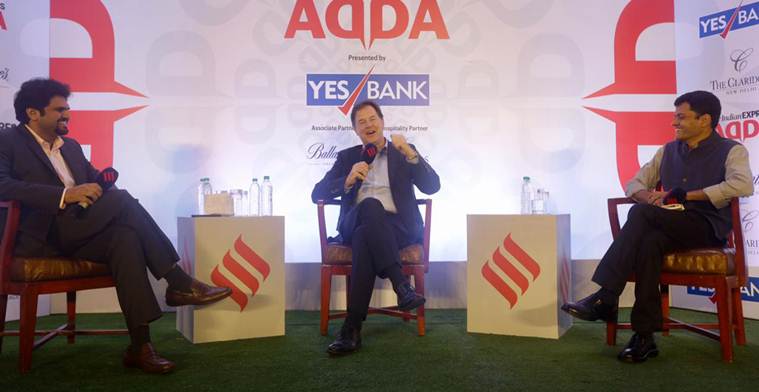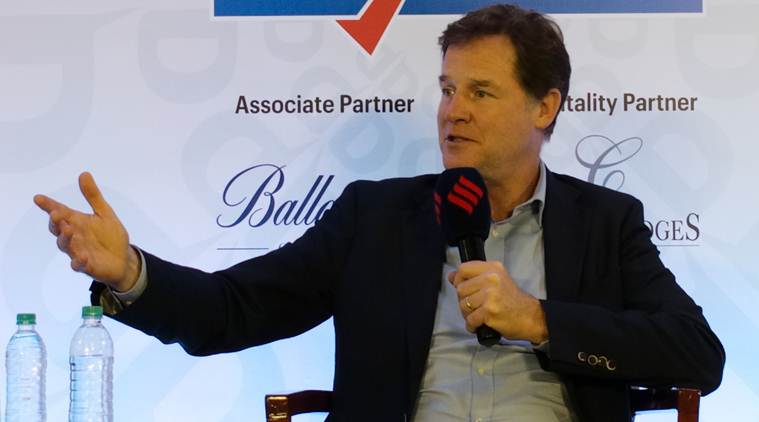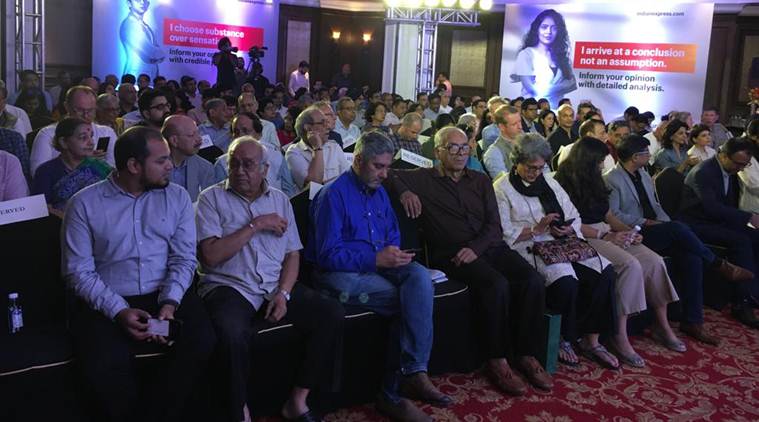Stay updated with the latest - Click here to follow us on Instagram
Nostalgia is not a great guide for the future: Nick Clegg at Express Adda
I often hear this analogy that big global companies, in this case Facebook, have more power over people’s lives than governments do. I think that’s nonsense, says Nick Clegg.
 Nick Clegg in conversation with Indian Express Executive Director Anant Goenka and Associate Editor Shubhajit Roy. (Express photo/Neeraj Priyadarshi)
Nick Clegg in conversation with Indian Express Executive Director Anant Goenka and Associate Editor Shubhajit Roy. (Express photo/Neeraj Priyadarshi)
At the Express Adda held in Delhi, Nick Clegg, former UK Deputy Prime Minister and Vice-President of Global Affairs and Communications at Facebook, spoke to Indian Express Group Executive Director Anant Goenka, and Associate Editor, The Indian Express, Shubhajit Roy on Brexit, data nationalism and challenging the analogy about data being the new oil.
 Nick Clegg with a portrait by Suvajit Dey, illustrator, The Indian Express
Nick Clegg with a portrait by Suvajit Dey, illustrator, The Indian Express
On the more powerful position: govt or corporate
I often hear this analogy that big global companies, in this case Facebook, have more power over people’s lives than governments do. I think that’s nonsense. If I think about decisions, often agonising decisions with lives involved within half-a-decade that David Cameron and I ran that government together — whether you go to war or not, whether you provide more money or not to hospitals or schools — these are things that touch people and their everyday lives in a much more material way than whether they use WhatsApp, Instagram or watch YouTube. I don’t want to belittle and certainly it is difficult to belittle the sheer scale of a company like Facebook, which has users across the globe, but they are using them according to their choice. None of that is as granular as the way in which governments really affect the everyday circumstances of people’s lives.
 Nick Clegg, Vice-President for Global Affairs and Communications at Facebook, in New Delhi. (Express photo/ Neeraj Priyadarshi)
Nick Clegg, Vice-President for Global Affairs and Communications at Facebook, in New Delhi. (Express photo/ Neeraj Priyadarshi)
On social media’s influence on elections and Brexit
I have seen it asserted, I don’t know how many times that Brexit was influenced by the Russians or Facebook or by Cambridge Analytica for instance. All of these assertions are made completely blissfully ignorant of the facts. The first fact is that we know from the British regulator, the information commissioner’s office has the data from Cambridge, we don’t have it. You keep asking us to analyse it, we can’t analyse it because the watchdog has the data, we don’t. They have said publicly that there was no data from the British voters involved.
On Facebook being in a controversial place
Of course, it’s controversial and it’s controversial for good reason and Facebook has had to learn from its mistakes. Generally, there is a great deal of antipathy and suspicion about big corporate companies… There are, quite understandably, great concerns about privacy. And we are going through a tech clash. The pendulum is swinging, as it often does when you disrupt technologies. At the beginning, people think that the new technology — in our case, the social media — is going to be a solution to all problems. People like Mark Zuckerberg walk on water and can do no ill… Now all our problems, apparently, are the fault of social media… It is naive to overpraise technology but it is also foolish to be over-cynical about technology.
 Dionyssios Kyvetos, Ambassador of Greece (left), and Hans Christian Winkler, Spokesperson and Head of Public Diplomacy, German Embassy
Dionyssios Kyvetos, Ambassador of Greece (left), and Hans Christian Winkler, Spokesperson and Head of Public Diplomacy, German Embassy
On WhatsApp and elections in India
India is by a long way the world’s largest WhatsApp nation. WhatsApp, like lots of messaging services, is an end-to-end encrypted service so we don’t have access, so we cannot share with law enforcement authorities the content of messages, unless the user sends them to us. That presents new challenges. How do we cooperate in a responsible and mature fashion under the law in response to legally sound requests for cooperation from law enforcement agencies… That was the subject of a lot of discussions (with the government). And I found it incredibly productive because I spent five years in Britain working with intelligent services, both in Britain and elsewhere, on common terrorist threats, and data is a really powerful weapon to defeat terrorism.
On the challenges facing global economy
Brexit is another form of erecting barriers to trade which previously didn’t exist. My personal view is that the laws of economics have not changed. In the end, if you make it harder for people to exchange goods and services with each other, it leaves everybody worse off…This is one of the greatest dilemmas in modern politics, which is that good politics and good economics are increasingly pulling apart. I come from a generation of politicians where we assumed that if we do good economics, the politics will flow. And one of the big changes you can see in Britain now is that there is a whole class of politicians who are absolutely adamant that Britain should do something, which every single economist will tell you is going to make people worse off, and they believe it is a patriotic act. So doing something which is economically self-harming is now considered to be the acid test of patriotism. That is very new.
 Friederike Tschampa, Head of Political Affairs, EU Delegation to India and Bhutan (left), with Brendan Ward, Ambassador of Ireland
Friederike Tschampa, Head of Political Affairs, EU Delegation to India and Bhutan (left), with Brendan Ward, Ambassador of Ireland
On the rise of autocratic leaders, economic insecurity and Brexit
A desire for control is very strong at the moment for a whole bunch of complex reasons. Maybe technology has played a role in this. I think insecurity in the labour market, just the sheer pace of change… demographics, mass migration, all of these things have fostered quite an acute sense of insecurity amongst many people around the world. Where I come from, Europe and the UK, it is impossible to exaggerate the significance of the 2008 financial crisis. Because what happened in the UK after the 2008 crisis was that the link between how hard you worked and how your pay increased just collapsed… And that means the central promise of capitalism collapses. So if you ask me what is the single biggest reason why Britain voted for Brexit amongst all the other ones, it’s 2008. If the 2008 banking crisis had not happened, I am pretty confident that Britain would not have voted for Brexit.
 (From left) Ankhi Das, Public Policy Director, Facebook, India, South & Central Asia; Kavitha Kunhi Kannan, Public Policy Manager, Facebook India; Shivnath Thukral, Public Policy Director, Facebook, India & South Asia
(From left) Ankhi Das, Public Policy Director, Facebook, India, South & Central Asia; Kavitha Kunhi Kannan, Public Policy Manager, Facebook India; Shivnath Thukral, Public Policy Director, Facebook, India & South Asia
On whether data is the new oil
This very used, or perhaps very overused analogy about data being oil justifies an approach to segmenting, fragmenting and hoarding data in different jurisdictions, which doesn’t make sense for India, for the openness and fluidity of the internet. The whole point of the internet is precisely that it is a global phenomenon, it’s borderless, and if you start over allying on analogies like oil, you are going to extract it from the earth, you either burn it in an engine or store it in a barrel, and you make it your own. It is a false description of what data does in the modern economy and it would lead to a sort of protectionist approach to data, which for instance the Chinese have upped from their terms successfully. Globally if we were to follow that model, China today, India tomorrow, then Vietnam, then Brazil, then the United States, everybody will start erecting data barriers and before you know it, the extraordinary ingenuity innovation of a borderless internet would have given way to a highly fragmented internet. So that’s why I shall challenge the analogy because I think it’s an analogy which justifies a Balkanised approach to the data economy.
On data localisation
Where the data is stored is not relevant… in Denmark or Texas. If the Indian authorities want to get more rapid access to data, particularly when it comes to pursuing data that extends beyond Indian jurisdiction, especially when dealing with anti-terrorism operations, the best way to do that is not to build a warehouse outside Delhi where you physically keep data. It is having a new agreement between the Indian and the US governments, particularly under the new Cloud Act, which facilitates such an agreement… I think most people in the technology world don’t think it makes sense to apply an old world analogy to the new world of fluid data. And that is why I deliberately chose to try and challenge the analogy because these are analogies of a sort of linguistic petri dish, in which these ideas take root, and it just represents a fundamental misunderstanding of how data flows across board, and how the internet works, and crucially there are much more effective mechanisms which are more effective at addressing the public policy objectives that the Indian government completely legitimately seeks.
 The audience at the Express Adda event in New Delhi. (Express photo/Neeraj Priyadarshi)
The audience at the Express Adda event in New Delhi. (Express photo/Neeraj Priyadarshi)
On data nationalism
I think we are now living through the years where the new rules of the internet will be written and we will look back in 20-30 years of time and sort of either regret or praise the efforts that we have made. We are all collectively the architects of rules for this data-driven technological revolution and there are three basic planets which will decide this fight for the open and closed internet: America, Europe and India. China made that call, that decision. As I keep saying, we don’t have one internet — we have two internets. We have the Chinese internet and the non-Chinese internet. And I think all of the three, you can roughly guess where they are going to go, you can guess where America is going to go, where Europe is going to go. But I think there is a real battle of the soul of where India is going to go. Is it going to go in a more data nationalistic direction, which at least borrows elements of the Chinese model or is India going to do, which I very much hope it does — as an open democracy, as an entrepreneurial generation, as a country which produces legions of IT geniuses — is to actually embrace and sustain the openness of the internet.
VOICE BANK
Patrick French: author and Dean of the School of Arts and Sciences, Ahmedabad University
 Patrick French
Patrick French
I wanted to ask about the Fixed-Term Parliaments Act, which you introduced as Deputy PM in 2012. Do you now think that the form in which the Act came in was a mistake?
No. The bill is doing exactly what it was designed to do, which was to stop the executive of the day from playing cat and mouse with the British people for her/his own political ends and to stop elections being inflicted on the British people from one moment to the next. It is quite right that the Parliament says, ‘We’re in the middle of the biggest constitutional crisis in the post-war period, so we’re going to withhold the consent of the executive to hold an election for their own political purposes’. People who don’t like it are usually Conservative supporting constitutionalists, or people who hanker for time when Prime Ministers could mess about the election timetable to suit their own ends.
***
Surendra Kumar: former Indian Diplomat
 Surendra Kumar
Surendra Kumar
For the last two years, the UK has been struggling to get an honourable divorce from the EU. Is it fair to say that the UK’s international stature is diminishing? Also, do you think in 10 years we are going to see a person of Indian origin living in 10 Downing Street?
We had the first woman PM and I hope that we will have the first PM from the diverse communities of the UK. Coming to the other question, I don’t know what is going to happen in the future. But I do know that there is an umbilical link between Britain’s place or exit from the family of nations that makes up the EU and the family of nations that makes up the UK because it is important to remember that majority of voters in Northern Ireland and Scotland voted to stay, so there will be an increasing sense of grievance, particularly, if we exit in economically-damaging terms. There is just now an open goal for Scottish nationalism to remake its case to the Scottish people and an increased chance that it will lead to Scotland leaving the UK. If you want to exercise power in the real world, you’ve to share power. We’re not in a position anymore to dictate the political weather around us. Britain has had its great history, we’re at a different place now; the most patriotic thing to do is to recognise that and not hanker for the past, which does not exist anymore. Nostalgia is not a great guide for the future.
***
Nikhil Pahwa: founder, MediaNama
 Nikhil Pahwa
Nikhil Pahwa
As a liberal, how would you reconcile individual rights over their own data with co-created data in the context of data portability? Secondly, if an Indian court demands it, would WhatsApp reconfigure its platform to bring in traceability?
There are a lot of signals like meta data, which we can share with law enforcement. What we can’t do is sort of un-invent end-to-end encryption. There are certain technological barriers. As a liberal, it should be our right as a consumer to move our data from one service to another, but here is the complication… Do you give every single person you have interacted with on Facebook the right to consent or withhold consent for you to move data? We need regulators to tell us where the boundary lies.







